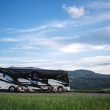So, you have the RV of your dreams. It’s your baby. You wash the outside regularly, wipe down the interior routinely and you keep up with maintenance like clockwork. It’s hard to fathom, but what would you do if something were to happen to your RV? Maybe another RV backed into it or someone saw their chance and drove off with it? Regardless of if you use your RV just for weekends or months on end, insurance is a must. Hopefully, you have insurance to help you out if anything like this were to happen to your beloved secondary (or primary) home.
Get A Free RV Insurance Quote Here
At RVUSA.com, we know how important having insurance on your RV is. That’s why we’ve put together a list of tips and tricks we know about getting the best insurance you can for your motorhome. In this article, we’ll cover what kind of insurance is best for you, what is and isn’t covered by insurance and what is included and excluded in certain plans. Keep reading for our best insurance secrets!
A quick side note before we get any further
In order to get the best RV insurance no matter what kind of RV you have, it’s a good idea to truly take care of it. Store it correctly and in the right areas according to the seasons and keep a clean driving record.
It’s definitely possible that you can add your RV to your existing car insurance policy, but RVs do much more than cars. They’re a home on wheels, so you’ll probably want to find better coverage than what your insurer will offer if you put your car and RV under the same plan. To better cover you financially, think about getting RV insurance. This kind of plan is a combination of home and auto insurance to make up for the issues an RV may have.
Basic RV Insurance
Liability:
To legally drive or use your RV, you need at least the same amount of coverage that your states requires for car insurance. If you’re ever the reason for a crash or accident, liability insurance will cover and injuries and property damages for the other party, up to your chosen limit.
Collision and comprehensive coverage:
Collision coverage helps pay for accidents to your RV if you cause a crash or run your RV into things like a tree. This kind of insurance covers a wide range of problems, like theft of your RV, animal crashes, falling objects and more.
Uninsured/Underinsured motorist coverage:
This type of insurance helps you cover and any passenger injuries if you get hit by a driver that isn’t insured or by someone who has insurance, just not enough to cover your side.
Medical payments coverage:
If you completely crash your RV, this will pay for injury treatment for you and passengers, regardless of who was at fault for the issue.
Other Insurance Options
If you want basic coverage, liability is your best option. You can simply tack on your RV to your car insurance. If you want additional coverage, there are a few other options that car insurance doesn’t offer.
Full replacement cost:
If your RV is totaled or stolen, comprehensive coverage normally only covers a depreciated replacement cost. This means you’ll receive what your RV was worth at the time of the incident. With full replacement cost, you’ll get back what you paid for your RV.
Travel expenses coverage:
If you have a crash or your RV breaks down on you, this coverage helps pay for a hotel and transportation while your RV is in the shop. The downside is that this typically covers you when you’re a specific distance away from your home.
Full-time RV coverage:
If you’re using your RV as your permanent residence, you’ll be required to have this coverage. It provides personal liability insurance close to what you’d find in a home insurance policy and coverage for your items kept in storage while you’re traveling.
Now that you have a few ideas on what different insurance options cover… Let’s look at some tips for finding the best insurance to best suit you!
Shop around and look at all your options before choosing an insurer and plan.
Though you can go straight to insurance companies…It also might be a good idea to get in touch with specialty agents or brokers. It’s possible that they can get you a better deal or offer you a kind of specialized coverage. If you RV full-time, this is more than likely your best bet because some insurance companies aren’t used to coming up with full-time RVer policies and they might not be fully educated on the matter.
Word of mouth in and around the RV community is covered with lots of valuable information.
Being able to network with fellow travelers and adventurers about their experiences with certain insurance companies is awesome information to take in when choosing your own insurance. You’ll find out how claims are handled, how their customer service works and other general information. Unfortunately, the moment we actually need the insurance company is when we found out how good they really are.
Don’t focus on just the price.
You’ll want to make sure you aren’t paying for unnecessary coverage, but it’s more important to get the coverage you really need from a company or broker that will be there when you need them. Look for a company that specializes in RV insurance and look at the actual features of each policy, not just the price.
Look for storage options.
Most RV insurance companies have an option that lets you put your coverage on hold when you aren’t actually traveling in your RV. The majority of people only use their RV here and there. This option can cut significantly cut costs versus paying for your policy full-time.
Look for a company that has great customer service.
Not only that, but look for a positive claims history and an easy claims process. Once something happens to your RV, stress is inevitable. The last thing you’ll need or want is a grumpy customer service rep who just wants to go on their ten-minute break. Some companies will let you submit a claim on their mobile app.
What are your tips for finding the best RV insurance? Let us know in the comments!






